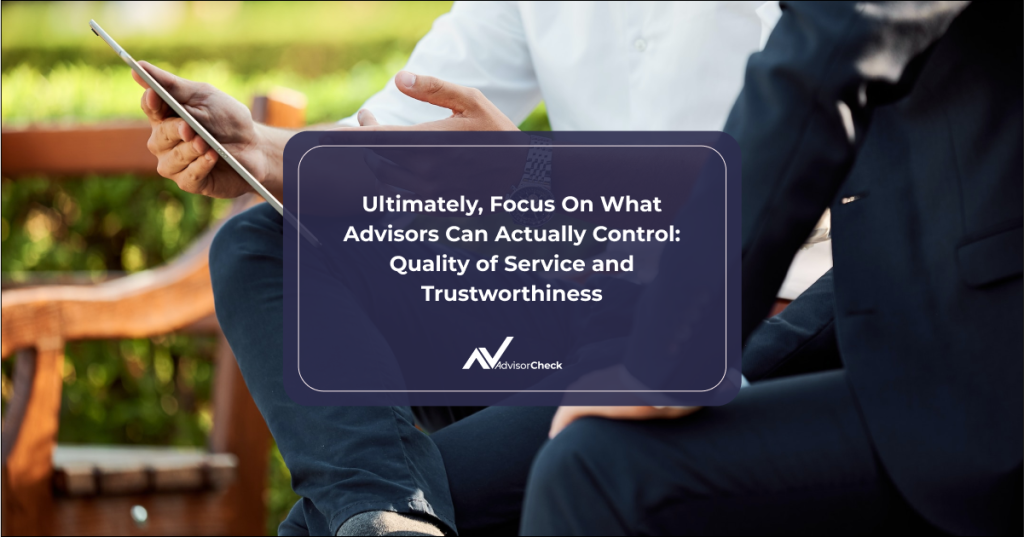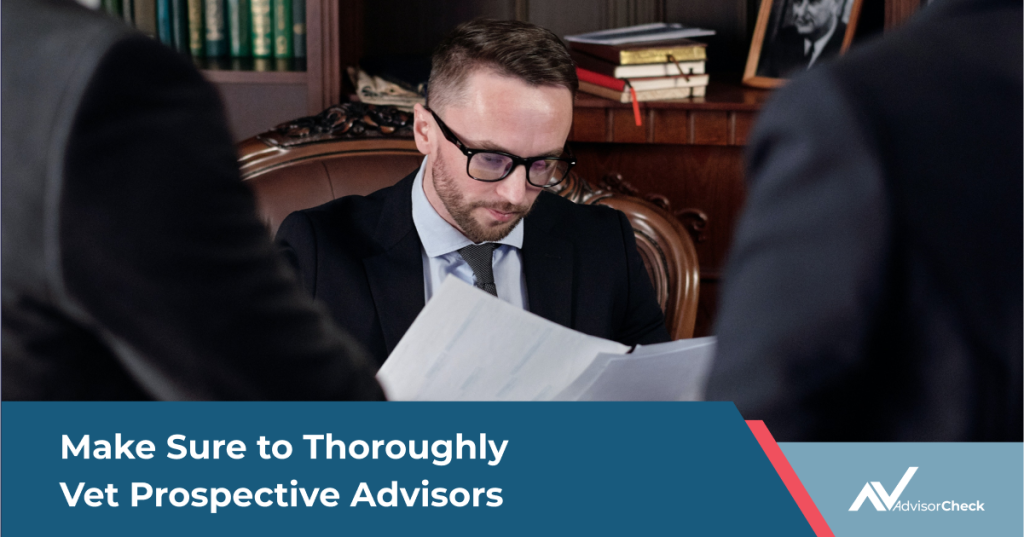
Financial Advisor
Experience, Certifications, My Time and Their Income: What Should I Look for In My Next Financial Advisor?
We are in the spotlight












When you’re planning to hire a new financial advisor, there are a plethora of factors you’ll want to consider before making such a crucial decision for your financial future. The array of indicators you might take into account when making this choice include their firm’s physical proximity to you, their success rate, how many years in a row their work has created profits for their clients, their average rates of return and lots more. We’ll explain what exactly are the most important features to seek out in a financial advisor, as well as which factors are relatively unimportant by comparison when you’re deciding who to work with. Experience is often considered to be one of the most important indicators of a reliable financial advisor, but we would argue that it’s somewhat overrated as an issue. Consider the choice between two potential financial advisors with very different backgrounds: Is the brand new advisor an automatically worse choice than the advisor with a 30-year track record? If you prioritize experience over everything else, then perhaps. But on the other hand, if you’d rather your financial advisor be someone who is working with a dedicated portfolio manager, then #1 is going to be a better choice for your needs. In addition, consider the issue that there are a lot of advisors who are talented at sales and have a lot of experience in that area, but do a poor job of managing assets. You might end up working with an advisor like this because you were unable to predict that they’ll be unskilled at asset management, but were relying on their track record of experience as the primary indicator of their trustworthiness. In this and many other cases, experience doesn’t actually dictate whether the advisor you’re working with will be good at their job. After all, doing your job for a long time isn’t the same thing as doing it skillfully. Then there’s the issue of certifications. Although they indicate that an advisor received a passing score (a minimum of about 70 or 80 percent) on whatever test(s) they took to receive their certification(s), note that that doesn’t mean that they actually internalized the information they studied. Certifications shouldn’t be the be-all and end-all when it comes to choosing your advisor; they might simply be a sign that a prospective advisor is good at test-taking. How much do factors like experience and certifications really matter when it comes to picking a financial advisor? Do their earnings and the amount of time they spend with me matter as well?
What Should I Look for In a Financial Advisor (and What Doesn’t Matter as Much)?

How Important is Their Level of Experience?

Do Certifications Matter and If So, How Much?

We all need help getting our finances in order throughout our lifetime.
Look through our database to find the most trustworthy financial advisors in your area.
For instance, if an advisor has five different certifications, they might have simply taken the tests in order to take the tests and rack up more certifications – rather than actually having that knowledge under their belt to put to use for their clients. An advisor with genuine expertise in just one area is going to provide much more valuable advice to their clients than someone who passed lots of tests but failed to retain the information they were tested on. Rather than as a representation of an advisor’s skill level, you should view certifications as indicators of an advisor’s areas of focus, and consider how those specialty areas relate to your own financial priorities. It’s a good idea to do some research on the wide variety of certifications that an investment advisor representative (IAR) or registered representative (RR) can receive, and what those certifications actually denote, so you can match your advisor’s specialties to your desired outcomes. Whether or not prospective advisors have a series 6, 7, 63 or 66 matters less, as these are more standard certifications that the majority of professionals in this industry have to get. They’re prerequisites, rather than being indicative of an advisor’s specialization. You do want to make sure that you work with someone who is licensed than someone who doesn’t have a license at all, however. Contrast this with more specific certifications like a certified financial planner (CFP), chartered financial analyst (CFA) and the like, which represent expertise in areas that you may be more concerned about. There’s a higher probability that someone who has received those kinds of certifications will be able to help you with your specific financial needs. That’s why we’d recommend you look for advisors with the specific two- or three-letter financial certifications that are most related to your goals, rather than the much more general licenses that the SEC and individual states require financial advisors to have. For example, if you are extremely wealthy, you might want a Certified Private Wealth Advisor (CPWA), and if you consider yourself a normal person, a Certified Financial Planner (CFP) might be a better choice. You should set reasonable expectations for the amount of time you’ll receive from a financial advisor. We would advise that if you’re undergoing significant life changes that also affect your finances in some way (e.g. marriage, having children, starting a new job, etc.), you’ll want to meet with your advisor a minimum of four times per year for as long as this is the case. On the other hand, if you’re generally going through fewer major life transitions and your finances are pretty stable, you can meet with your advisor less often (maybe once a year or so). You can also assess your meetings with your advisor based on their actual monetary value, which will depend on how much you pay them per year. For example, let’s say you have $100k under their management and you pay your advisor 1 percent of that amount, equal to $1,000 per year. If you meet with your advisor four times a year for one hour at a time, this means you’re paying your advisor $250 per hour to meet. This can be seen as a reasonable amount to spend on professional financial advice with tangible long-term benefits to your portfolio. Compare this to a situation where you have $1 million under their management and pay the advisor 1 percent of that, or $10,000 per year. Meeting with them four times a year means you’re paying $2,500 per hour for their advice. While you may be paying more per hour through your meeting, they may also be doing more behind the scenes that you are able to see. Consider this. There are 2,000 working hours in a year. If your advisor has 100 clients (including yourself), they may want to meet with each of you four times a year. If each meeting is two hours long, those meetings alone could take up 800 hours of their working schedule. That leaves 1,200 hours for them to dedicate towards back office work, research, investment portfolio management and so forth. So while you can calculate how much you spend on your advisor through your meetings, make sure to consider that they are doing a lot of work behind the scenes. How Much of Their Time Will They Give Me?

A financial advisor does more than just manage your money. They help you get your finances in order both for today and in the future.
Use AdvisorCheck to find the best financial advisor to help you get your life on track.
The amount of their time your advisor provides you isn’t the absolute most important factor to assess them by, as the quality of their work is much more significant than the quantity. Compare an advisor’s income to how much you’re paying to work with them. The higher the ratio of (1) their total income to (2) how much they’re making from working with you, the less time they’re likely to dedicate to your portfolio. You have two choices here: you can either be a big fish in a small pond or a small fish in a big pond. Here’s an example to help you conceptualize this general rule of thumb (which isn’t set in stone by any means, but rather is another helpful tool for assessing your compatibility with an advisor). Let’s say you start working with an advisor who’s making $500,000 per year, and you plan to move over $500,000 of your money to be managed by them. Depending on their firm and its commission structure for money under management, the advisor will make roughly 1 to 3 percent of that $500,000. So if they’re making $5,000 a year from your account, and $500,000 is their annual income, that means your account contributes only 1 percent of their overall income. You can expect to receive about 1 percent of their time (and, by extension, their care and concern) toward managing and overseeing your portfolio. On the other hand, by working with an advisor who is earning more money, you will be exposed to more of the tax benefits and investment strategies and opportunities that are catered towards a higher net worth audience. If, instead, you work with an advisor who’s earning significantly less than $500,000 a year, you’ll probably end up receiving more of their time and care, because you’re objectively a more valuable client to them. This could also limit you to the type of investment exposure that you could want for yourself as well, so it is good to weigh out the pros and cons of both scenarios to see which outcome best suits you. “Many people might feel intimidated to start a relationship with a financial advisor, because they may assume that need to bring $100,000 in investable assets with them in order for a financial advisor to even start a conversation with them,” said Leonard Kim of AdvisorCheck. “However, that is not always the case. Some advisors will work with people who have much less capital. In fact, I started my relationship with my financial advisor with a deposit of $500 that was put into a retirement account, so do not be intimidated that financial advisors only work with people who have a lot of investable money,” Leonard continued. There’s also another side to how advisors are paid: some registered representatives are paid to sell products with commissions or built-in hidden fees. Although sometimes these might appear to be free to consumers because there’s no flexibility in price, your advisor might receive a commission from the maker of the product. These kinds of products include: When your advisor recommends a financial product, it’s a good idea to ask what percentage they will receive as a commission to assess whether the product is truly being recommended in your best interest – or if your advisor is simply trying to make an easy profit off of you. The age of your advisor can be a significant factor when it comes to overall compatibility. Although older advisors have more experience on average, and experience is absolutely valuable, we’ve already established that it’s not the be-all and end-all that many think it is. In particular, working with an advisor who’s closer to you in age means that the two of you will have a shared generational frame of reference, so communication between the two of you is likely to be easier. Overall, we’d advise that you probably want to work with someone several years older than you, with at least a fair amount of experience. (Keep in mind that depending on how old you are, this may be harder or easier to find, because the average age of financial advisors is 55 and one-fifth of advisors are 65+ years old.) If you do end up working with an advisor who is younger than you, make sure that they have a reasonably experienced team behind them. This means that your younger advisor could be the “face” of your relationship, while a whole panel of financial experts could be working behind the scenes to make your money work for you – this could very well be an ideal balance. Related to the issue of age, ease of interpersonal communication is a major concern when it comes to choosing the right financial advisor. Figuring out which prospective advisors you get along with is a matter of meeting with them directly and seeing how your conversation goes. If you’re choosing among several one top-notch advisors who meet all the other criteria – they’re reasonably experienced, their certifications match your financial goals, their income isn’t too high in comparison to the amount they’ll earn from your account and they’re a suitable age – our best advice is to go with your gut. The more comfortable you feel talking to your advisor, the easier it will be to have open and productive conversations about your finances, to ask them honest questions even when it may feel a bit awkward, and to trust that the advice they’re offering is in your best interest (more on this in the next section). The two most important characteristics to seek out in a financial advisor are high-quality service and trustworthiness. The reason we’re emphasizing these elements is because they’re the two most important factors that an advisor can actually control. No matter how skilled and savvy they are, no advisor can control the behavior of the market, economy, taxes, inflation or interest rates. They can, however, control the quality of the service they provide you with, and the sense of trust they cultivate with their clients by being honest and reliable. A fair assessment of prospective advisors focuses on the things they can actually control. Before you go ahead and take the major step of hiring a financial advisor, you need to vet them properly. This means doing a due diligence check on every prospective advisor, in addition to speaking with a minimum of three advisors before you choose to start working with anyone. Using the AdvisorCheck search tool is the easiest way to run a detailed background check on a prospective advisor and do your due diligence in vetting them. AdvisorCheck will provide you with detailed reports on any prospective financial advisors, including: Not only can the site’s search tool help you rule out any significant red flags in your advisor’s legal and professional history by locating information that might otherwise be inaccessible, AdvisorCheck can also notify you of new events once you’ve hired an advisor (e.g. if a new disclosure is added to their record or they file for bankruptcy). When deciding which professional to hire for the crucial task of managing your finances, focus on the quality of their services, the relationship of trust that they cultivate with their clients, the specialized expertise conferred by their certifications and who you get along with on an interpersonal level. You might also take into account their experience, their age, and their income/how they’re paid, but make sure to do so with the various caveats we described above in mind (e.g. remember that an advisor’s experience level isn’t as big of a deal as many people make it out to be). Finally, before you actually hire someone, don’t forget to meet with at least three prospective advisors and to thoroughly vet any potential hires using a tool like AdvisorCheck to make sure that their professional history doesn’t contain any hidden red flags. Written by Billy Quirk Fact checked by Luke Jara Reviewed by KJ KimWhat About Their Income and How They Are Paid?

Are They Paid to Sell Financial Products?
Does Your Advisor’s Age Matter?

How Well Do You Get Along With This Advisor?

Ultimately, Focus On What Advisors Can Actually Control: Quality of Service and Trustworthiness

Make Sure to Thoroughly Vet Prospective Advisors

Your go-to source for:
- Breaking out from living paycheck to paycheck
- Countering inflation with saving hacks
- Saving for your or your kid’s futures
- Turning home ownership from a dream into a reality
Disclosure The information provided in this article was written by the research and analysis team at AdvisorCheck.com to help all consumers in their financial journeys, by providing the resources and the insights to help improve one’s financial health, make it through recessionary and inflationary periods of time, and save their earnings to use them towards building a secure financial future. Unauthorized reproduction or use of this material is strictly prohibited without prior approval. Any parties interested in content syndication, references, interviews, or PR, please contact our marketing team at marketing@aimranalytics.com AdvisorCheck.com is an independent data and analytics company founded on the principles of helping to provide transparency, simplicity, and conflict-free information to all consumers. As an independent company providing conflict-free information, Advisorcheck.com does not participate, engage with, or receive funding from any affiliate marketing programs or services. To become a free AdvisorCheck member, visit advisorcheck.com/signup.
Most read
The content of video and blog articles are for informational and entertainment purposes only and do not constitute investment, tax, legal, or financial advice. Always consult with a qualified professional before making any financial decisions. The views expressed are those of the author and do not reflect the opinions or recommendations of any affiliated entities.
